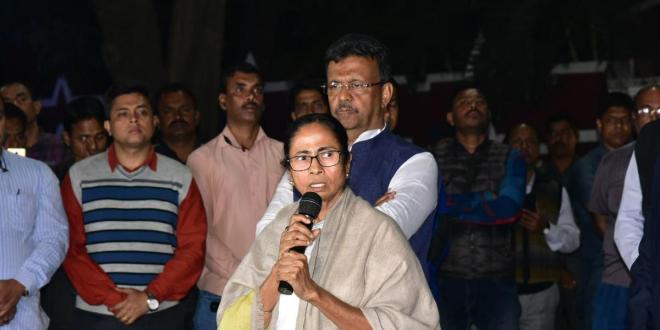‘It pains me to witness politics of discrimination’ : Mamata
Kolkata, Mar 1: West Bengal Chief Minister Mamata Banerjee on the occasion
of UN Zero Discrimination Day, today said, “It pains me to witness the politics of
discrimination being woven into the fabric of India.”
Taking to her Tweeter handle, Ms Banerjee said, “Today on @UN #ZeroDiscriminationDay,
it pains me to witness the politics of discrimination being woven into the fabric of India.
“Let us pledge to uproot all forms of division based on caste, creed, and religion from our
society. We will never stand for discrimination of any kind,” she added.
On March 1, people around the world join together to celebrate Zero Discrimination Day.
The day aims to encourage equality before the law and in practice throughout all of the
member countries of the United Nations.
The theme of this year’s Day is the fight against discrimination faced by women and girls,
and the organization aims to raise awareness, mobilize action, and promote equality.
Globally, at least one in three women and girls have experienced violence in their lives,
with adolescent girls experiencing higher rates of intimate partner violence than adult women
overall. This figure hides deep disparities, with more than 50% of women in some countries
reporting violence just in the past 12 months, according to United Nations report.
Although some countries have made progress towards greater gender equality,
discrimination against women and girls still exists everywhere.
Inequalities, discrimination and violence continue to be enabled within the very structures
of society. In many countries, laws that discriminate against women and girls remain in
force—in areas of work, property, criminal law and sexual and reproductive health and rights,
among others.
More than 80 countries criminalize some aspect of sex work, and women are
disproportionately affected by laws that criminalize drug use. Meanwhile, laws that uphold
women’s basic rights and protect them against harm and unequal treatment are far from
the norm.
For example, only 88 out of 190 countries have laws regarding equal pay for work of equal
value for men and women. Intersecting with other forms of discrimination, on income, race,
ethnicity, disability, sexual orientation and gender identity, these rights violations
disproportionately harm women and girls.
Numerous government commitments to end violence and discrimination against women and
girls have been made over the years, yet hundreds of millions of women and girls continue to
be subjected to discrimination, abuse and violence, at huge cost to themselves and to their
families, communities, societies and economic development.
The UN first celebrated Zero Discrimination Day on March 1, 2014, after UNAIDS, a UN
program on human immunodeficiency virus (HIV) and Acquired Immune Deficiency
Syndrome (AIDS), launched its Zero Discrimination Campaign on World AIDS Day in
December 2013.
UNI


Comments are closed.